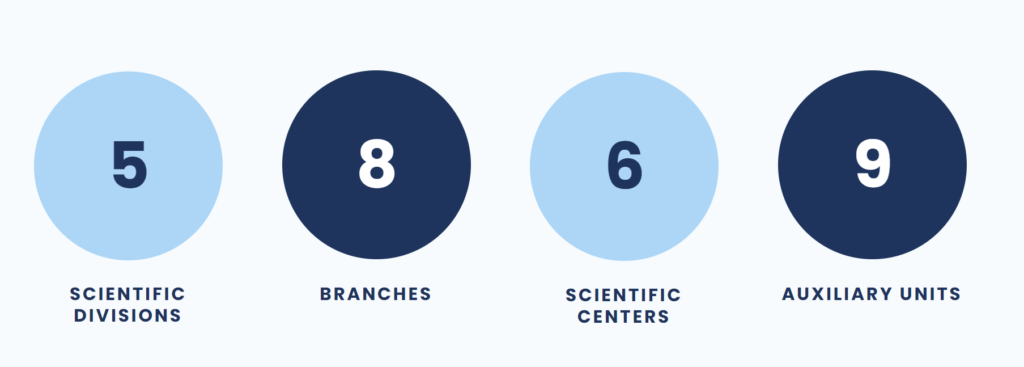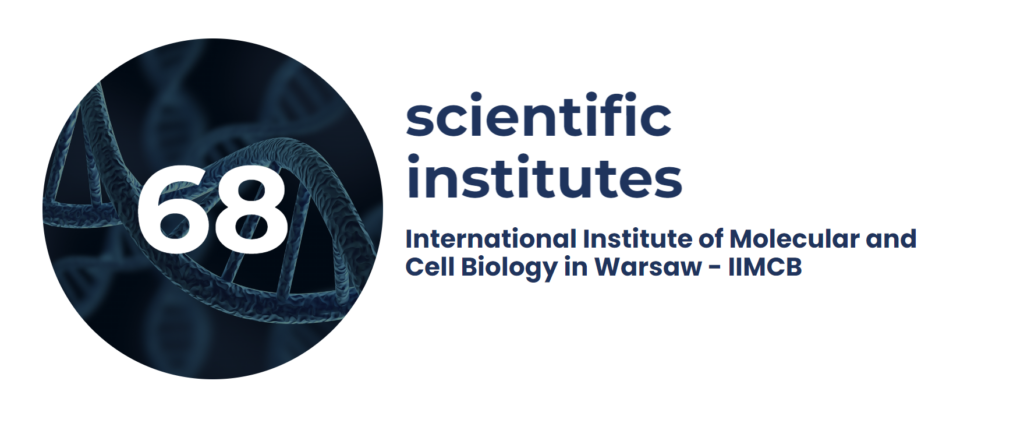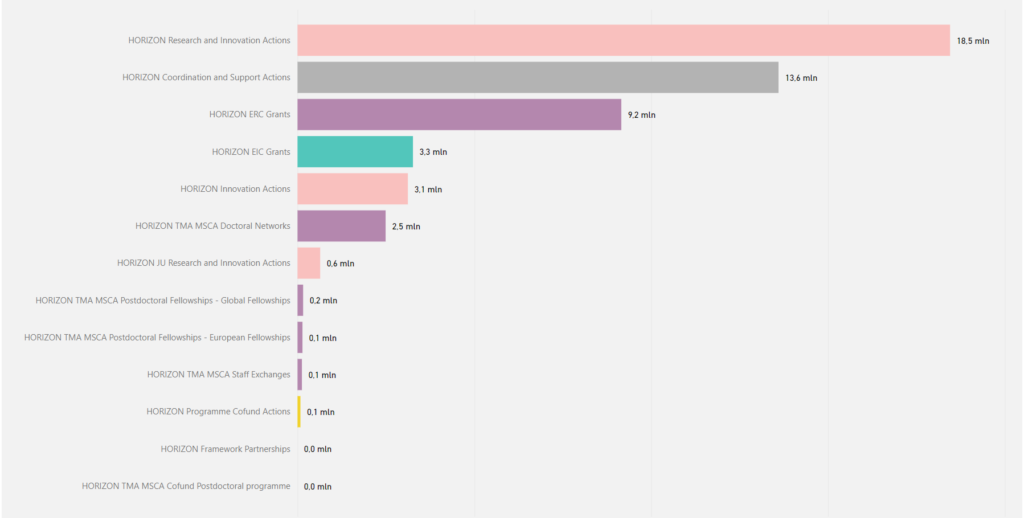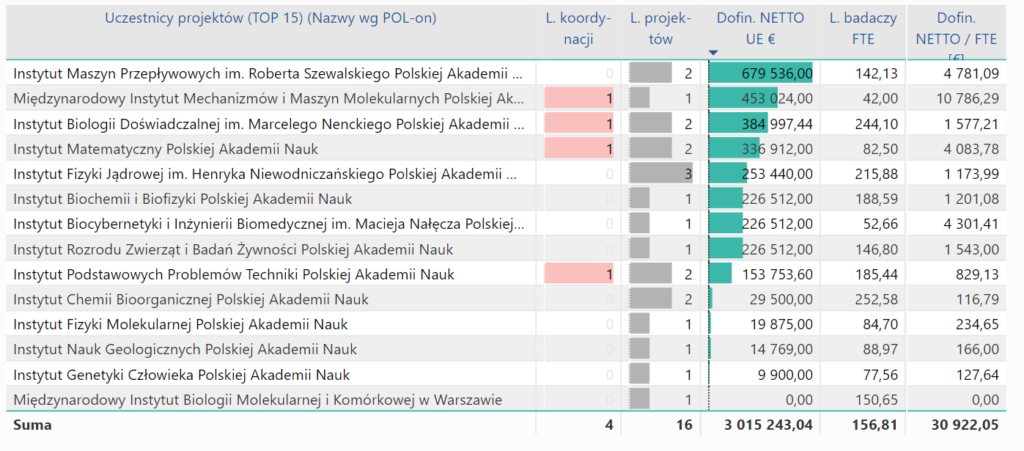The Institutes of the Polish Academy of Sciences have secured over 50 million euros in funding in Horizon Europe programme. Research teams and scientists from more than half of PAS Institutes are involved in projects under Horizon Europe. Learn more about the participation of APS Institutes in the EU Framework Programs below.


The Polish Academy of Sciences

The Polish Academy of Sciences (PAS) is a major state-funded institution of higher education and research in Poland. It consists of three main pillars: a body of elected members, a network of research institutes (including some of the top scientific centers in the country), and also a set of committees focused on specific disciplines and problem issues.
The first these is the elected body of Members of the Academy, which consists of up to 350 National Members – all of them highly distinguished scholars and scientists of renowned achievements and respected authority. The Academy also currently has 163 Foreign Members. Membership in the PAS is considered a great honor and an expression of the highest recognition for preeminent scholarly accomplishments. Since 2010, an elected body of talented researchers of the younger generation, known as the Polish Young Academy , has also been operating within the structure of the PAS.
The second pillar of the Polish Academy of Sciences is the network of PAS research institutes. The strongest research network in the country, it consists of 69 scientific institutes , many of them ranking among the very best in Poland, indeed even Europe and the wider world. The PAS Institutes are engaged in carrying out top-notch research projects in almost all scientific fields. They generate the inventions, patents, and scientific advances that are the Academy’s hallmark, helping to expand humanity’s horizons and change the world in a positive way.
The third pillar, in turn, consists of a set of committees and advisory panels that disseminate scientific knowledge and provide the kind of expertise that is crucial for robust public debate. These are expert groups that draw together specialists with different narrow specializations and fields of expertise. They create a space for intellectual exchange and relationship-building among scholars. They serve as the national-level representation of various scientific communities and disciplines and they perform important advisory functions.
Other important parts of the Academy include its auxiliary units, including libraries, archives, museums, a botanical garden and conference centers . The Academy also has territorial branches centered in eight Polish cities, which serve to integrate the local scientific community in the region, to initiate research and to disseminate research results. Moreover, the Academy also maintains a strong presence outside of Poland, via its scientific centers in six major European capital cities.

Scientific Institutes

The Polish Academy of Sciences maintains the strongest research network in the country, consisting of 68 independent research Institutes (plus the International Institute of Molecular and Cellular Biology). The PAS Institutes are engaged in carrying out top-notch research projects in almost all scientific fields. They generate the inventions, patents, and scientific advances that are the Academy’s hallmark, helping to expand humanity’s horizons and change the world in a positive way.
Like all research institutions in Poland, the Institutes affiliated with the Polish Academy of Sciences are subject to strict period evaluation in terms of the quality of research work done there in particular disciplines. In all, 17 of the disciplines practiced at the PAS Institutes have received the highest category (A+ – awarded to the top elite of Polish science) in the latest evaluation. Another 40 received the next-highest category (A). This is well above the average for research institutions in the country as a whole.
All told, the Institutes of the Polish Academy of Sciences employ more than 9,000 people, including nearly 4,100 researchers. The internationalization rate of scientific staff across all the Institutes is 8%, although the ratio is significantly higher at some centers. For example, the PAS Center for Theoretical Physics employs 40% foreign scholars, the Nicolaus Copernicus Astronomical Center employs 31%, and the PAS Institute of Physical Chemistry and the PAS Institute of Mathematics employ 25% (October 2021 data).
The PAS Institutes regularly receive grants from the National Science Center (NCN) and the National Center for Research and Development (NCBR). They have won a total of 103 million euros under the EU’s Horizon 2020 program (implemented from 2014-2020) – the best result among Polish scientific units. Also noteworthy are the 5 Dioscuri Centers of Scientific Excellence supported by Germany’s Max Planck Society – international research groups established at PAS Institutes and led by prominent researchers.
Participation of PAS Institutes in framework programs
Data based on National Contact Point dashboards (as on 12.01.2024)
The Institutes of the Polish Academy of Sciences have secured over 50 million euros in funding in the Horizon Europe program. Research teams and scientists from more than half of the PAS Institutes are involved in projects under Horizon Europe. The total net EU contribution for Institutes of PAS in Horizon Europe amounts to 51.24 million euros, with 38 institutes engaged in 103 projects, including 15 coordinations.

Amnog PAS Institutes, top performers in Horizon Europe inlcude:
- International Institute of Molecular and Cell Biology in Warsaw – IIMCB
- Institute of Bioorganic Chemistry, PAS
- Nencki Institute of Experimental Biology, PAS
- Institute of High Pressure Physics, PAS
- Institute of Oceanology, PAS
- Institute of Slavic Studies, PAS
- Institute of Rural and Agricultural Development, PAS
- Institute of Nuclear Physics, PAS
- Institute of Fluid-Flow Machinery, PAS
- Center for Theoretical Physics, PAS

The PAS Institutes obtained the highest funds under the instruments of Widening Participation and Spreading Excellence. These instruments contribute to building research and innovation potential in countries with R&I levels below the EU average, aligning with the objectives of European Research Area policy.

In terms of the total amount of funds obtained by PAS Institutes, grants from the European Research Council ranked second. ERC grants aim to finance creative and innovative projects in all fields of knowledge. They not only provide substantial funds for research but also serve as a globally recognized symbol of scholarly excellence. Pioneering ideas leading to significant discoveries and groundbreaking results are highly appreciated. Both novice and established researchers, working (or willing to work) in the European Union or countries associated with the Horizon Europe Program, can participate in these competitions. The primary criterion is scientific excellence. ERC offers several types of grants.
PAS Institutes secured the highest amount of funding from Horizon Europe through Research and Innovation Actions (18.5 million euros) and Coordination and Support Actions (13.6 million euros). Within the ERC grants obtained and implemented in PAS Institutes, a total of 9.2 million euros in funding was acquired. [Click on the graphic to open in a new tab and enlarge]

- Research and Innovation Actions: Action primarily consisting of activities aiming to establish new knowledge and/or to explore the feasibility of a new or improved technology, product, process, service or solution.
- Coordination and Support Actions: Actions consisting primarily of accompanying measures such as standardisation, dissemination, awareness-raising and communication, networking, coordination or support services, policy dialogues and mutual learning exercises and studies, including design studies for new infrastructure and may also include complementary activities of strategic planning, networking and coordination between programmes in different countries.
Participation of PAS Institutes in Horizon Europe Pillar I: ERC Grants
PAS Institutes are participating in 6 ERC grants funded under Horizon Europe that are conducted in:
- Institute of High Pressure Physics, PAS
- International Institute of Molecular and Cell Biology in Warsaw – IIMCB
- Nencki Institute of Experimental Biology, PAS
- Institute of Slavic Studies, PAS
- Institute of Systematics and Evolution of Animals, PAS
- Institute of Bioorganic Chemistry, PAS

Under the previous Horizon 2020 Framework Program, PAS Institutes participated in 9 ERC grants, with three units—Nicolaus Copernicus Astronomical Center of PAS, Institute of Mathematic of PAS and Nencki Institute of Experimental Biology, PAS implementing two ERC grants each.
The Excellence in Science Department of the Polish Academy of Sciences, operating within the Academy’s structure, provides comprehensive and free assistance in preparing applications for prestigious ERC grants (European Research Council). Researchers from Polish scientific institutions can benefit from this support.
Participation of PAS Institutes in Horizon Europe Pillar I: MSCA Grants
PAS Institutes are implementing mobility and training projects under the Marie Skłodowska-Curie Actions. In Horizon Europe, PAS Institutes are currently executing 16 MSCA projects, with 4 of them being coordinated by PAS institutes.
Marie Skłodowska-Curie Actions (MSCA) support researchers at various stages of their professional careers by funding research and training in Europe and beyond. At the same time, the programme enables institutions to develop their staff through the recruitment of researchers and the participation of staff in international research and training projects. The programmes included in MSCA can be carried out in any scientific discipline and can concern both fundamental and applied research. The basic requirement is the international mobility of researchers (source: NAWA)

Opracowała: Magdalena Dobrzyńska, magdalena.dobrzynska@polsca.pan.pl


